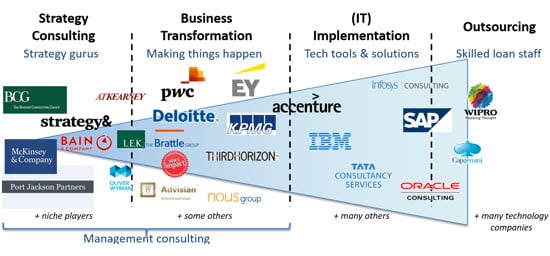Whether I was talking to graduates, MBAs or experienced professionals, as a consulting club president at business school, I was frequently asked the same question, “What is the most efficient and quickest way to transform into a consultant?”
Honestly, this could be one of the toughest questions one can ever answer.
First let me be clear, the word ‘Consultant’ has such a broad spectrum that includes hundreds of roles from outsourcing technician, personal coach, freelancer, technical consultant and business consultant. The type of consulting that most people asked me about is actually business consulting, or being more specific, management consulting.
Simply put, management consulting is a profession that requires practitioners to possess solid and wide business common sense, deep professional knowledge in 1-2 domains (such as Marketing, Retail, Operation), and most importantly, intellectual capability to solve complicated business problems for clients.
As the frequency of answering this question increased, I felt that there was an urgent need to be fulfilled, so I decided to start blogging here with a series of articles trying to answer this question in a most efficient and insightful way.
As is a consultant’s usual practice, let’s first clarify what the question is about. The question is asking for a way to become a ‘management consultant’ in the shortest time and with the least amount of irrelevant effort. However, it is very obvious to all that there won’t be ‘a correct answer’ that fits whomever asks that question. Several factors need to be considered before we can shed light on this issue. Starting with the part of the management consulting value chain you want to put yourself into, a second factor is the firm you are interested in. Next is the country where you would like to live. Last one is the position you will apply for. These factors shape the answer to your question by clarifying the four critical dimensions.
Now let me explain a little bit more in detail. The management consulting industry is far from being a big mono chunk. A whole value chain exists in this industry. To make it easier to understand, I drew the graph below (Graph-1).
The consulting industry as I said has a wide spectrum of businesses, while management consulting firms are focusing more on the higher levels of the value chain doing strategy related projects such as business transformation, operation enhancement, market entry strategy, or business growth strategy. While other so called consulting firms at the edge of management consulting are doing more implementation projects. And on the very right of the graph are those consulting companies who provide outsourcing technicians. So, the answer will be different if you choose to do strategy consulting rather than implementation consulting.
Now the second factor is, which firm? The graph above is just a drop in the ocean of the thousands of consulting firms in the market. That being said, the number of firms on the value chain has a pattern of increasing from the left side to the right side of the graph, meaning there are a very limited number of firms doing strategy consulting, some more doing business transformation, many more doing implementation and a huge number of firms providing outsource technician and professional services. Within management consulting, there are tier one firms like M.B.B (McKinsey, Bain, BCG), and tier two firms like Strategy&, AT Kearney, L.E.K, Oliver Wyman, Port Jackson Partners, and Arthur D. Little. More importantly, each firm has a very different culture, industry focus, as well as ways of recruiting talent.
The third factor is, which country? You may wonder, does that matters? Many firms are multinationals. Unfortunately, Yes, it matters. For instance, Bain is much bigger than McKinsey and BCG in Australia, it covers most critical industries such as mining, telco, retailing and financial services. While in China, McKinsey seems to have enjoyed the first mover advantage for years by tapping into SOEs (state owned enterprises) in insurance, manufacturing and government advisory. You should think about which country you are applying for and how the firms you are targeting differ in that market.
Finally, which position? Career ladders vary from firm to firm. But there are some similarities. In McKinsey, the entry level position is BA (business analyst) followed by Junior/Senior Associate, Engagement Manager, Associate Principal and Partners (some countries may have slightly different versions). So, think about your background and age. Which position you target is critical to your success since consulting firms usually have an ideal candidate for each position. For example, if you are around 27-30 years old with an MBA or master degree and 2-3 years working experience, your application will be placed under the Junior/Senior Associate position in McKinsey. That means, even if you are qualified to be a BA, firms will not usually consider you as a suitable candidate.
These four factors will be different for each individual. Make sure that you assess these four dimensions before you start applying to be a consultant. This will save you tons of time, and give you a SMART goal. Now, you may wonder how can you do that? Just stay chill, I will unfold all the details in later blogs. The intention of mine is to give you a road map to guide you through the mysterious continent of management consulting.
A trailer of the roadmap is listed below. Stay tuned!
- Understanding firms’ selection criteria
- Preparing for the application
- All you need to know during the interview
- After getting the offer (or not)
- An interview with a McKinsey Associate about his journey into the industry
Free Download: This guidebook distils all of Mike’s insights on how to achieve success in your journey towards a career in management consulting: download now!
Mike believes that technology is the engine of the future, while business capability is the wheel!
Image: Pexels


One reply on “For Beginners: A Roadmap into the Consulting Industry”
[…] criteria of those management consulting firms. I assume that you have carefully considered those four critical factors outlined in my first article and really committed to the management consulting position that you […]